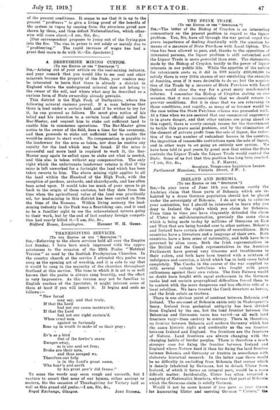A DERBYSHIRE MINING CUSTOM.
[To THE EDITOR OP THE " SPECTATOR.")
SIR,—Arising out of your article on the coal-mining industry, and your remark that you -would like to eee coal and other minerals become the property of the State, your readers may be interested to learn that there is already .a district in England where the underground mineral does not belong to the owner of the soil, and where what may be described as a curious form of State ownership already prevails.
This district is the High Peak of Derbyshire, where the following mineral customs prevail. If a man believes that there is lead under a certain field, and if he wishes to try for it, he can proceed as follows. He must give notice of his belief and his intention to a certain local official called the Bar-Master, and request him to stake out sufficient land to enable him to commence operations. The Bar-Master gives notice to the owner of the field, fixes a time for the ceremony, and then proceeds to stake out sufficient land to enable the would-be miner to start work. No compensation is payable to the landowner for the area so taken, nor does he receive any royalty for the lead which may be found. If the mine is successful and more land is required to work it,. the BarMaster may again be called upon to stake out what is needed. and this also is taken without any compensation. The only right which the unfortunate landowner retains is that if the mine is left unworked for a fortnight the land which has been taken reverts to him. The above mining right applies to all the land within the Hundred of the High Peak, with the exception of gardens, orchards, and churchyards, and has often been acted upon. It would take too much of your space to go back to the origin of these customs, but they date from the time when the agricultural value of the land was practically nil, for lead-mining in this district has been carried on from the time of the Romans. Within living memory the leadmining industry in the Peak was a flourishing one, and it used to be a familiar sight to see the ochre-stained miners going to their work, but by the end of last century foreign competition had nearly killed it.—I am, Sir, &c., Bidford House, Leamington. HERBERT W. H. GREEN.


































 Previous page
Previous page